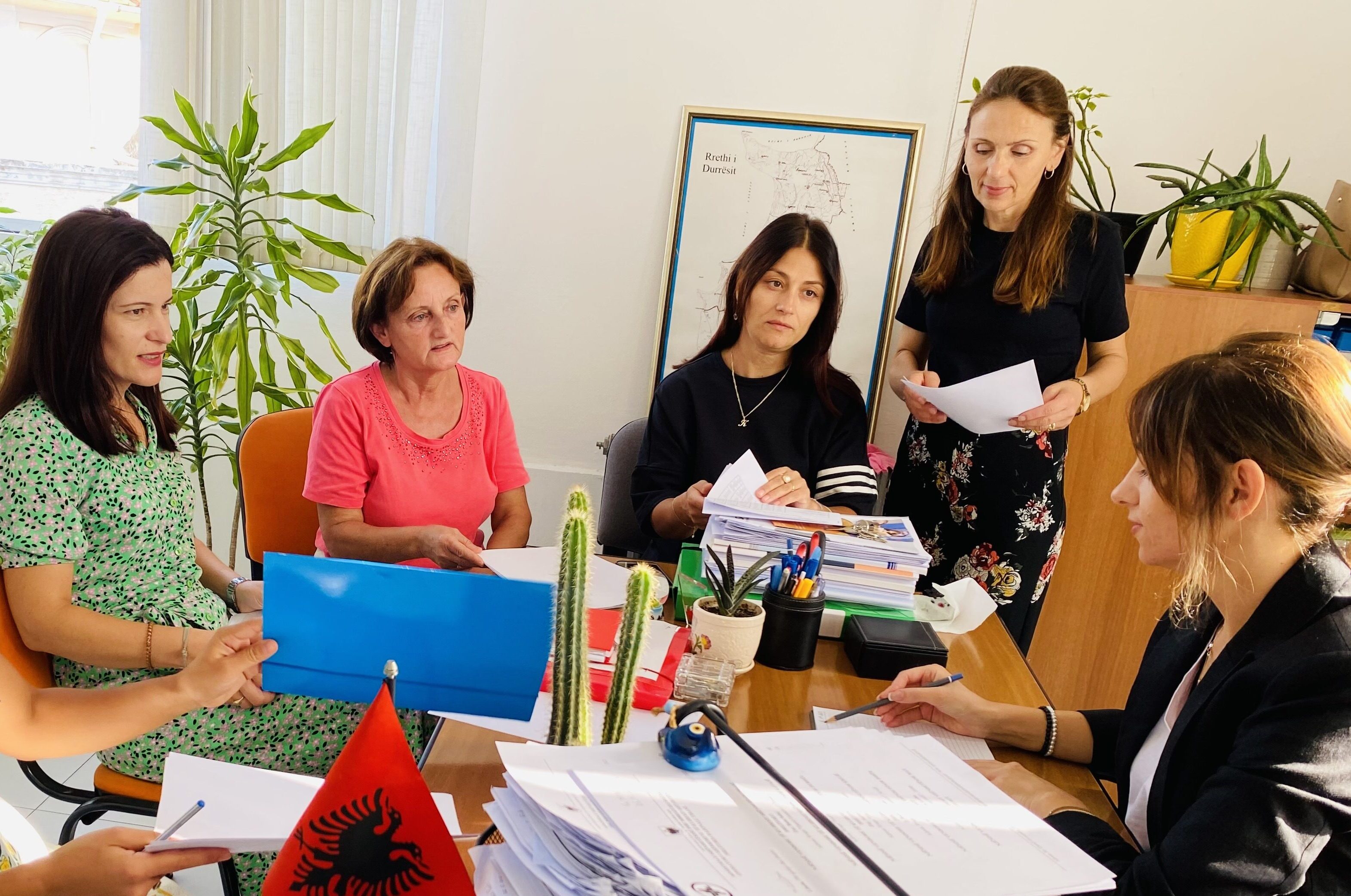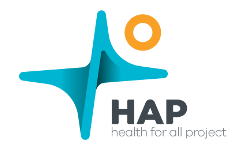
In the coastal town of Durrës, Albania, over 100,000 residents are witnessing a transformation in their primary healthcare service with the Local Healthcare Unit leading the change. We spoke to Eriona Petro who has held the pivotal position of the Chief of Primary Healthcare Services in the region since 2016 to tell us more about how the cooperation with HAP has elevated local healthcare capacities and services significantly improving community well-being and increasing access for vulnerable groups.
Can you summarize for us in a few words the main interventions that the Durrës Local Unit of Health Care (LUHC) has implemented in collaboration with the Health for All Project?
Over these years, our collaboration with the HAP project has focused extensively on enhancing the capacities of healthcare staff in Primary Health Care (PHC). Notably, the Training of Trainers (ToT) sessions offered by HAP for the trainers’ team of Durrës LUHC regarding the implementation of treatment protocols for Diabetes Mellitus, Hypertension, Dyslipidemia, Asthma, and COPD in PHC. Subsequently, our trainers provided ToT for a pair of FD-FN from each Health Center (HC) in Durrës, who continued with the formation of Peer Groups (PG) in the 18 HCs to carry on training their peers on the implementation of updated protocols for the five non-communicable diseases (NCDs). A crucial aspect of the protocol implementation for NCDs has been the training we conducted in collaboration with HAP, aimed at empowering monitoring capacities for the supportive supervision of FD and FN in the application of updated protocols. This ensures sustainability in their implementation. Another successful intervention implemented in the framework of “Strategy for the Development of Healthcare Services in Albania 2020-2025” by the Ministry of Health and Social Protection (MoHSP) is the implementation of Home-Based Care services in HC No. 2, HC No. 4, HC Rrashbull, and HC Xhafzotaj. Throughout the process, from the presentation of the intervention, the approval of the internal regulation for Home-Based Care, to the creation of the database for chronic patients benefiting from this intervention, and the IF training on standard nursing procedures in Home-Based Care, we have had HAP’s technical and logistical support. We are now in the process of expanding Home-Based Care to HC No. 1, HC Shijak, HC Manëz, and HC Ishëm.
Meanwhile, to implement the medical care protocol for the elderly in PHC after HAP’s training-of-trainer sessions with the LUHC and the family doctors and nurses from 4 HCs, the Durrës trainers’ team conducted ToT for a pair of FD-FN from the other 14 HCs of Durrës, who continued with the formation of Peer Groups in their respective HCs. This way, Peer Groups for ‘Medical Care for the Elderly in PHC’ were established in all 18 HCs.
How have these interventions impacted the improvement of health and well-being in your community? Particularly, in improving access to healthcare services for vulnerable groups?
All implemented interventions, which have primarily focused on the professional development of healthcare staff, translate into the provision of higher-quality healthcare services in the community. Higher-quality services, as a direct result of staff knowledge update, improve overall health and well-being of the community. Regarding the implementation of Home-Based Care in the selected HCs so far, there has been a significant improvement in access to healthcare services for vulnerable groups.
What measurable results or improvements have been observed since the implementation of these interventions? What are the new services offered thanks to HAP’s support?
The implementation of updated protocols for managing NCDs, as well as the implementation of Home-Based Care services in 8 HCs, with plans to extend it step by step to all 18 HCs, facilitated by the technical and logistical support from HAP, have improved the quality of services provided to patients up to now, and have also led to a more accurate documentation approach. The planned and standardized provision of healthcare services at home, including all standard nursing procedures, is a crucial factor in increasing access to healthcare services for vulnerable patients.
Can you tell us how NjVKSH Durrës has been engaged in supporting HCs in the implementation of new interventions, in expanding these interventions beyond the HCs selected for HAP support and in monitoring and evaluating progress?
In the implementation of new interventions, such as the Home-Based Care in LUHC, dedicated teams were engaged to provide support throughout all phases of its implementation in the initially selected 4 HCs. Subsequently, the teams of these centers provided technical support for further extending the intervention in the chosen centers. LUHC offered training-of-trainer sessions beyond the initial training-of-trainer sessions provided by the project. We also supported and made operational Peer Groups in all HCs of Durrës LUHC.
At the same time, we periodically monitored the progress made by the Health Centers during the implementation of these interventions. Continuous monitoring during the implementation phases has created the opportunity for us to improve further during the implementation.
Have you encountered challenges or obstacles during the implementation of these interventions, and how have you overcome them?
During the years of collaboration with the HAP project, one of the main challenges was finding suitable ways to motivate healthcare staff to have a fresh approach to the healthcare service they provide. We did not encounter difficulties in overcoming this challenge, as once the interventions to be implemented were clear in the presentation and well-organized in the steps to be followed, the staff were willing to apply them. The logistical support from the HAP project facilitated the implementation of interventions for both the LUHC and the HCs.
What are the key lessons and best practices you have drawn from the success of these interventions that, in your opinion, can be valuable for other Regional Health Directorates seeking as much success as you?
I believe the main reason the interventions have been successful lies in two aspects. The first and most important is the organized teamwork and continuous communication between the responsible individuals in the HCs and those in the primary care service for the implementation of specified interventions. When the staff is well-informed about the assigned tasks, the implementation becomes easier. The second is drawing relevant lessons for every hurdle encountered during implementation and finding the most practical alternatives for overcoming difficulties. When communication channels are kept open, there is always a solution to the problems encountered along the way.
Sustainability is a critical aspect of the success of any project. What strategy do you plan to follow to ensure the continuity of the results of these interventions beyond the project’s duration?
Every achieved result requires effort and dedication to continue moving forward. Therefore, monitoring the work done so far and increasing the capacities of the staff of the HCs and LUHC for monitoring interventions will be the main goal. At the same time, ongoing training of healthcare staff according to the needs, by the teams of HCs and LUHC already trained on the implemented interventions, are the two most crucial components to ensure the sustainability of the interventions implemented.
Looking ahead, what are the plans or goals of NjVKSH Durrës to build upon the achievements of the Health for All Project?
The closest plan is to expand the Home-Based Care service to the Health Centers where it has not yet been implemented, relying on the experience gained from the collaboration with the HAP project and the capacities of our qualified healthcare staff. We have already completed the phase of establishing and implementing Peer Groups in the 18 HCs on the protocol for Elderly Care in Primary Healthcare, and we will continue to monitor its implementation.
Eriona Petro has held the position of the Chief of Primary Healthcare Services in the Local Unit of Healthcare in Durrës since 2016 and has been a lecturer at the “Aleksandër Moisiu” University in Durrës since 2012. Ms. Petro received her Master’s Degree in Pharmacy from the University of Tirana and holds qualifications in Pharmaceutical Policy Analysis, Epidemiology and Healthcare Quality from Utrecht University, the Albanian Institute of Public Health and the International Society for Quality in Health Care respectively.

